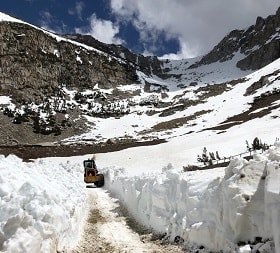Triple Frontier: Hawaii filmed as South America
JC Chandor’s action thriller Triple Frontier largely used Hawaii as a stand-in for South American story settings.
By Nick Goundry 13 Mar 2019

JC Chandor’s action thriller Triple Frontier largely used Hawaii as a stand-in for South American story settings.
The Netflix film follows a team of former Special Forces soldiers who reunite to carry out an audacious heist in a remote multi-border region of South America. Ben Affleck, Oscar Isaac and Charlie Hunnam lead the cast.
“In Hawaii, you get beaches and jungles but also a lot of rain because of the island climate,” says Catherine Kagan, the film’s supervising location manager, in comments to KFTV. “We had to deal with a lot of mud and nothing ever dries!”
Kagan adds that Hawaii’s military presence makes production a challenge, while the dangers of ordnance left over from the Second World War were problematic for the Triple Frontier team as it affected the team’s set-building options.
The movie also faced issues filming on a beach near an oil rig, which required complex discussions with structural engineers and oil executives as well as local authorities.

“The logistical challenges are balanced against the fact that Hawaii looks simply phenomenal with beautiful locations and the most spectacular sunsets,” Kagan says.
Hawaii’s jungles and other tropical locations are frequently favoured by US producers and indeed Kagan has worked there before on Jurassic World: Fallen Kingdom.
Scenes in Triple Frontier set on South America’s Andes ridges were in fact shot in the Mammoth Lakes region of California (pictured), where the crew worked with the US Forest Service.
Chandor’s team ventured outside the US for only a few days, shooting scenes in and around the favelas in a small town near Colombian capital Bogotá for a little over a week, with the support of local service company Dynamo.
Security was the biggest local issue, with the team taking industry advice from Netflix executives who already had extensive experience shooting in Colombia over the course of multiple seasons of drug drama Narcos.
“Filming in the favelas is very, very dangerous,” says Kagan, “The budget increases as you need local liaisons and middlemen, as well as an extensive security network made of local police as well as private contractors – and everybody you’re bringing in needs somewhere to stay during the shoot.”

Colombia’s production profile has been on the rise since the country launched a filming incentive. Indeed, Dynamo had worked on Peter Berg’s action movie Mile 22 in Bogotá shortly before they started on Triple Frontier. In the end, however, Chandor’s film wasn’t able to benefit from Colombian financial support as the fund was already allocated for the year.
Kagan says she would certainly consider Colombia as a filming location for future productions, while bearing in mind that equipment needed for a sizeable US production would need to be imported.
Netflix is set to sustain its commitment to the country with a drama series adaptation of Gabriel García Márquez’s seminal 1967 novel One Hundred Years of Solitude.
Main page image: Neflix. Article images courtesy of Catherine Kagan.

“The logistical challenges are balanced against the fact that Hawaii looks simply phenomenal with beautiful locations and the most spectacular sunsets,” Kagan says.
Hawaii’s jungles and other tropical locations are frequently favoured by US producers and indeed Kagan has worked there before on Jurassic World: Fallen Kingdom.
Scenes in Triple Frontier set on South America’s Andes ridges were in fact shot in the Mammoth Lakes region of California (pictured), where the crew worked with the US Forest Service.
Chandor’s team ventured outside the US for only a few days, shooting scenes in and around the favelas in a small town near Colombian capital Bogotá for a little over a week, with the support of local service company Dynamo.
Security was the biggest local issue, with the team taking industry advice from Netflix executives who already had extensive experience shooting in Colombia over the course of multiple seasons of drug drama Narcos.
“Filming in the favelas is very, very dangerous,” says Kagan, “The budget increases as you need local liaisons and middlemen, as well as an extensive security network made of local police as well as private contractors – and everybody you’re bringing in needs somewhere to stay during the shoot.”

Colombia’s production profile has been on the rise since the country launched a filming incentive. Indeed, Dynamo had worked on Peter Berg’s action movie Mile 22 in Bogotá shortly before they started on Triple Frontier. In the end, however, Chandor’s film wasn’t able to benefit from Colombian financial support as the fund was already allocated for the year.
Kagan says she would certainly consider Colombia as a filming location for future productions, while bearing in mind that equipment needed for a sizeable US production would need to be imported.
Netflix is set to sustain its commitment to the country with a drama series adaptation of Gabriel García Márquez’s seminal 1967 novel One Hundred Years of Solitude.
Main page image: Neflix. Article images courtesy of Catherine Kagan.
Latest news & features
Featured profiles
Promote your services with KFTV
Choose from three profile types - Basic, Silver and Gold
Create ProfileWe offer a range of display advertising opportunities.
Learn More